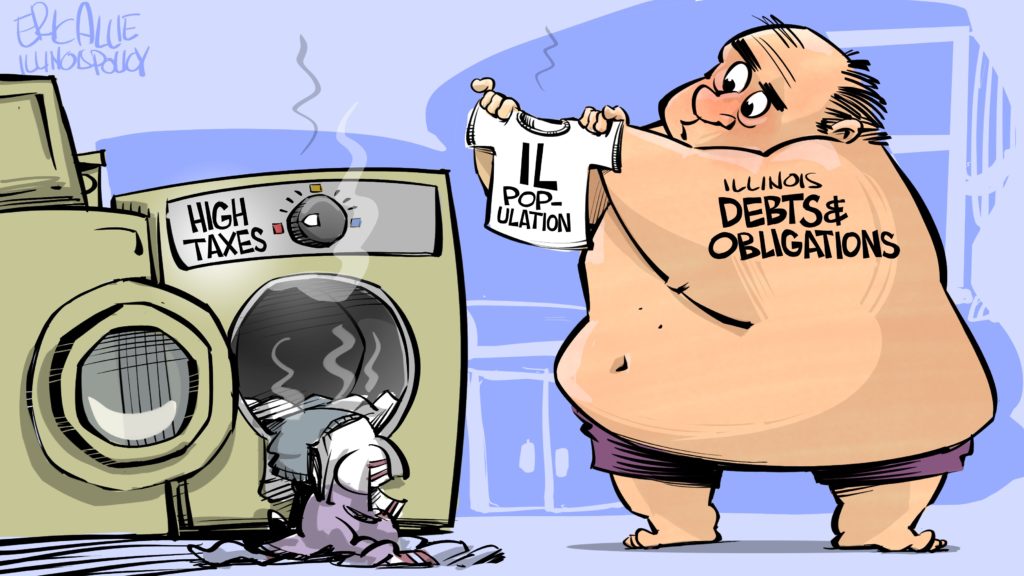Will Team Biden Weaponize Workers’ Pensions?
Big Labor abuse of worker pension and benefit funds as a means of advancing union bosses’ self-aggrandizing policy objectives is a familiar phenomenon.

Forced-Unionism State Running Out of Time to Fix Its Finances
According to a new analysis, based primarily on data from Moody’s Investors Service, Illinois taxpayers are on the hook for a total of $424 billion in state and local retirement debt.
Divide Illinois’s $424 billion in retirement debts by the state’s 4.8 million households, and it comes to a “shadow mortgage” of $90,000 per household, as Wirepoints, a Wilmette, Ill.-based nonprofit, reported in February.
How did the Prairie State get in such a deep hole? Quite simply, over the course of decades, Big Labor public officials repeatedly sought to please government union bosses, who wield monopoly-bargaining power over most of the state’s civil servants, by making extravagant promises that were effectively impossible for taxpayers to keep.
Hardworking Illinoisans Are Refusing to Be Left Holding the Bag
Not surprisingly, more and more Illinois taxpayers are refusing to be left holding the bag.
They are pulling up stakes and moving to other states — typically those with Right to Work protections for employees — that have managed their finances less irresponsibly. Of course, as this happens, the “shadow mortgage” on the taxpayers who remain increases even more.
At the state government level alone, Illinois has accumulated more than $233 billion in debt in its five pension funds.
“That dwarfs the public pension debts of Right to Work Florida and Texas, both of which have far larger populations than does Illinois,” noted Matthew Leen, vice president of the National Right to Work Committee.
“Moreover, Right to Work Indiana and Wisconsin, Illinois’s neighbors to the east and the north, respectively rank #2 and #6 in the country for having the lowest unfunded pension liabilities, according to a 2019 analysis prepared for the American Legislative Exchange Council.
“Many Illinoisans already see the writing on the wall. They recognize that, because of the irresponsible actions of state politicians who have been elected and re-elected with lavish forced dues-funded support from the union political machine, their already high tax burdens are destined to go even higher.
“Taxpayers who have viable opportunities to get out are seizing them, in greater and greater numbers.
“In 2018 alone, according to data recently released by the IRS’s Statistics of Income division, Illinois lost net totals of 86,000 tax filers and dependents and $5.57 billion in taxable income as a consequence of out-migration to other states.”
To Save the State, Big Labor Special Privileges Must Be Revoked
“This was no anomaly,” emphasized Mr. Leen. “As Wirepoints pointed out last summer, from 2000 to 2016, Illinois lost an average of $2.4 billion in taxable income a year due to net outflow of taxpayers to other states. And that figure doesn’t even include any of the income taxpayers earned after the first year of their departure.”
“To make Illinois a viable place to start a business and/or rear a family, several major policy changes must occur in the relatively near future.
“One change for which Wirepoints has made a very compelling case is that public officials reform future accruals for government pension benefits for employees who have already been hired, as well as for those who haven’t been hired yet.
“Unfortunately, because of illogical and partisan rulings by the Illinois Supreme Court, the people must first amend the state constitution to empower public officers to modify government pension benefits before they are even earned.
“And once the so-called ‘pension-protection’ constitutional provision is amended, union bosses will still be able to use their monopoly power under state law to block needed reforms in the way public employees are compensated.
“Therefore, to save Illinois, it will also be necessary for lawmakers to remove government union bosses’ monopoly-bargaining power over employee pay, benefits, and work rules.”
Given that Big Labor has dominated Illinois politics for decades, prospects for genuine, dramatic reforms in the state capital may seem slim, said Mr. Leen.
But just a few months from now, fed-up citizens can send a clear message to politicians in Springfield, Ill., that they must rein in out-of-control spending by rejecting the 60% hike in the state’s maximum income tax rate that union-label politicians have put on the November 2020 ballot.
“If the income-tax-hike scheme is thwarted,” explained Mr. Leen, “a fiscal catastrophe will be staring Illinois legislators in the face.
“At that point, a significant share of them may recognize the time is up for a number of erstwhile sacred cows, including forced union dues and government-sector union monopoly bargaining.”
If you have questions about whether union officials are violating your rights, contact the Foundation for free help. To take action by supporting The National Right to Work Committee and fueling the fight against Forced Unionism, click here to donate now.

Big Labor abuse of worker pension and benefit funds as a means of advancing union bosses’ self-aggrandizing policy objectives is a familiar phenomenon.

Leaked CTU Proposals Won’t Do Anything to Improve Schools’ Poor Performance

What impact does handing a union monopoly power to deal with your employer on matters concerning your pay, benefits, and work rules have on your pay?